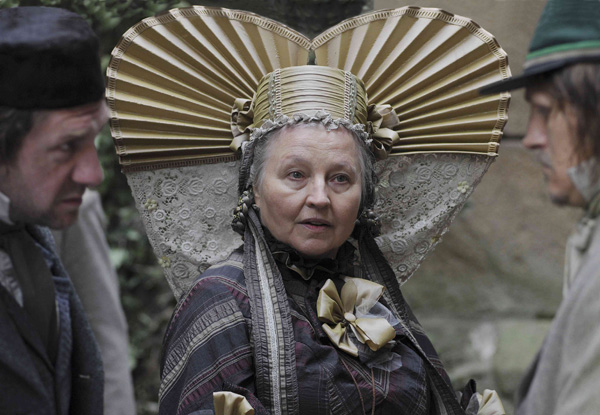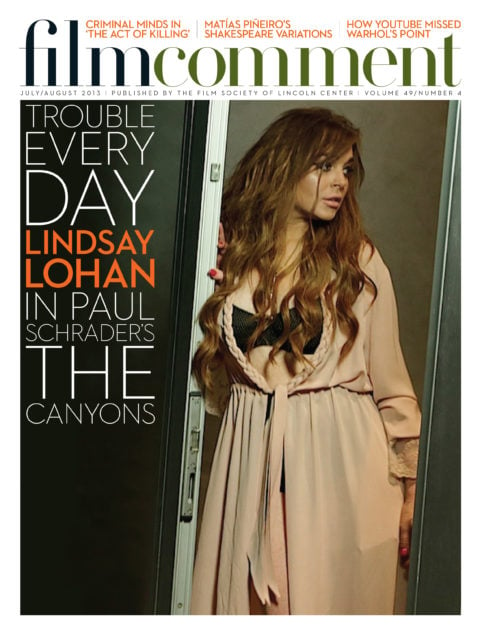
The opening scene sets the tone. After a short prologue in the heavens, the camera rockets us back to earth, into a small German village—part Dürer, part Murnau—and finally settles upon the internal organs of a fresh corpse. Dr. Faust (Johannes Zeiler) is eviscerating a dead man, looking for his soul. And, in this reworking of the famous legend, loosely based on both the Goethe and Thomas Mann versions, Sokurov intends to do the same. He will dig into the fertile loam of human decay to extract understanding and beauty (and some crass humor too). His Faust is both metaphysical and foul. If the premise sounds off-putting and pompous, the result is simply wondrous.
Faust, which won the Golden Lion at Venice in 2011, is meant to be the final chapter of Sokurov’s tetralogy on the sick nature of power. (Ironically, or perhaps fittingly, Putin was somehow involved in securing the film’s financing.) The first three—Moloch (99), Taurus (01), and The Sun (05)—delved into the private lives of real historical figures (Hitler, Lenin, and Hirohito) in their final days. Here however, the action centers on an initially common and powerless man, and an eminently fictitious one too. But what is the story of the penniless, hungry Heinrich Faust, trapped in his miserable village whose streets are lined with mold and human refuse and where the devil resides in the guise of a moneylender who goes by the name of Mauritius Mueller (astonishingly incarnated by Russian mime and rock musician Anton Adasinsky), meant to reveal about the essence of power?
In this shift from the historical to the allegorical, the meaning is not entirely clear (and the dialogue itself at times deliberately semi-coherent). Is Faust intended to be a prequel to the cycle, a reflection on the origin of power, on its acquisition? Is human weakness the cause of tyranny or its prey? In the film’s final, otherworldly scene in which he confronts the devil, does Faust emerge redeemed or doubly damned, having now internalized the evil he fought? In a way, the answer is ultimately beside the point; the outcome is as puzzling and contradictory as human nature itself. Even the devil appears at times as an endearing nihilistic old bastard, while the pure Margarete (Isolda Dychauk) inspires a base carnality at odds with the holiness of her ethereal face. Like a Rorschach test of the human condition, Faust manages to encompass and invite all of these interpretations. But above all, it translates them into an arresting visual object.

In fact, while the film may officially belong to Sokurov’s “Power Cycle,” it could just as easily be cast as a diptych counterpart—this time inspired more by German culture than French—to Russian Ark (02). Faust and Mephistopheles may not be quite as abstract as the “Narrator” and the “European” who walked us through the museum (then again the legendary Doctor and his Devil friend are not exactly the most concrete of protagonists), and the damned disease-ridden German village they amble through is no Hermitage, but the images Sokurov and cinematographer Bruno Delbonnel conjure from its greenish muddy palette, foggy light, and compressed bodies (distorted by anamorphic lenses) are like so many Bruegels, Boschs, Vermeers, and Rembrandts come to life. The unusual choice of a squarish 1.37 aspect ratio, like a window on a parallel universe, makes the experience all the more singular and unearthly. It is so lush, so exhilarating that it almost exhausts you. And it almost immediately calls for a second viewing.
To write about Faust is to wish that superlatives had not become so cheapened by overuse. Calling Sokurov’s film a “masterpiece” seems like a disservice. It is, however, undeniably the work of a master. It does have its excesses, but it is a film of exceptional richness and abnormal beauty.








